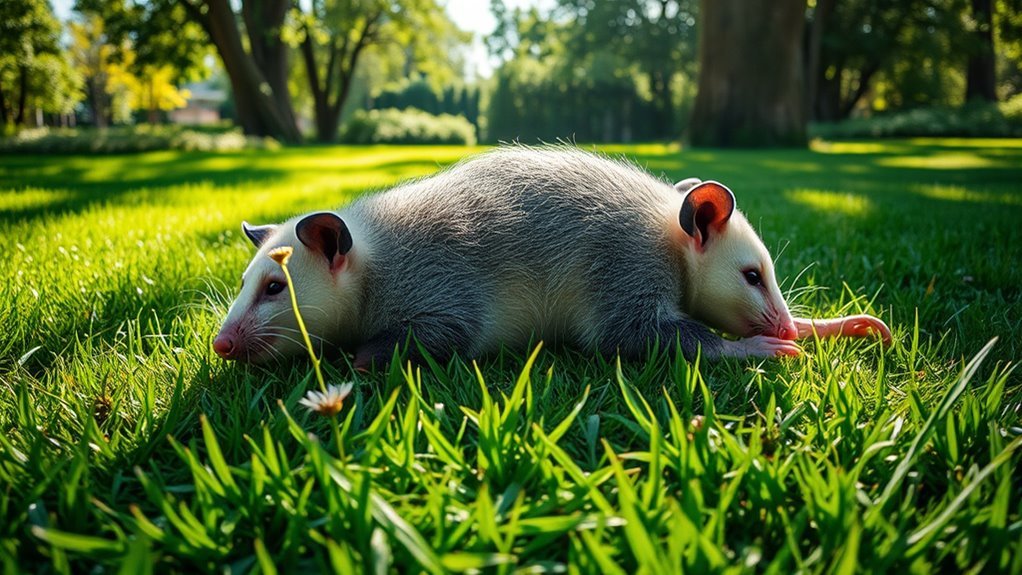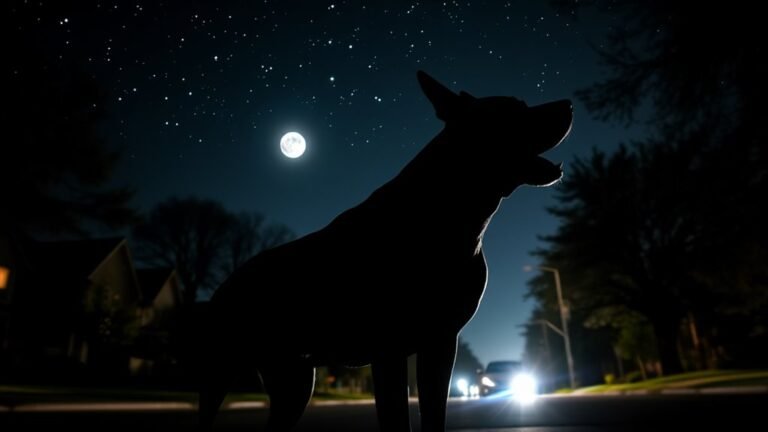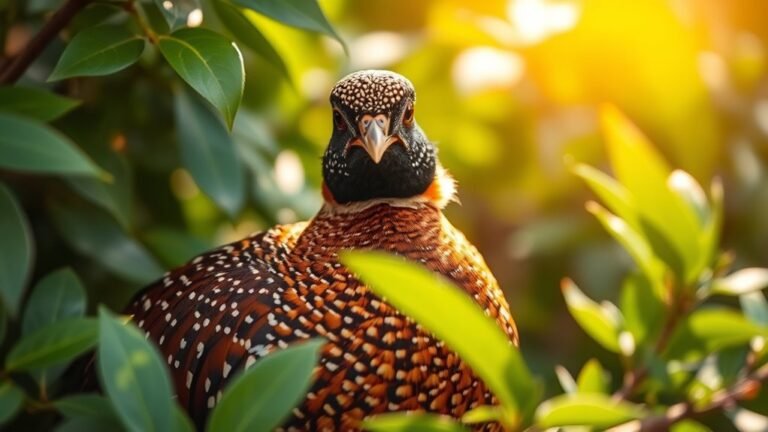13 Spiritual Meanings of Dead Possum in Yard
When we encounter a dead possum in our yard, it's easy to overlook the deeper significance this event may hold. Together, we can explore how this seemingly mundane occurrence can represent transformation, caution, and even an invitation to reflect on our own vulnerabilities. Each spiritual meaning tied to this moment encourages us to contemplate our relationships and the cycles of life. As we begin to unpack these layers, we might find ourselves questioning what this message truly means for us. What insights could we uncover about our personal journeys?
Key Takeaways
- A dead possum symbolizes transformation, indicating the need for personal growth following loss or change in life circumstances.
- It serves as a reminder to reflect on hidden dangers and the importance of vigilance in personal relationships.
- Encountering a dead possum encourages embracing vulnerability, fostering authentic connections through shared emotions and experiences.
- It prompts life evaluation, urging individuals to reassess priorities and align actions with their true values.
- The presence of a dead possum invokes spiritual awakening, highlighting interconnectedness and the pursuit of inner peace through nature connection.
Transformation and Change
When we come across a dead possum in our yard, it often serves as a powerful symbol of transformation and change. This moment, though unsettling, nudges us to reflect on our own lives and the cyclical patterns that define our journey. Just like the possum's departure, we all face moments of loss, which can lead to profound personal growth.
As we observe the natural decay of the possum, we're reminded that endings aren't just losses; they're also invitations to evolve. This cycle of life teaches us that each ending creates space for new beginnings. We might feel a sense of grief, but within that sorrow lies the potential for renewal.
When we embrace these changes, we find ourselves more attuned to the rhythms of nature and our own emotions. We come to understand that transformation isn't always comfortable, yet it's essential for our growth.
Message of Caution
The presence of a dead possum in our yard can also carry a significant message of caution. It urges us to listen to our cautionary instincts, reminding us that not everything in life is as it seems. This unfortunate creature may symbolize hidden dangers or potential threats lurking nearby, prompting us to be vigilant and aware of our surroundings.
As we reflect on this protective message, we might find ourselves considering areas in our lives where we've been too trusting or complacent. It encourages us to pause and assess the situations we're in, whether they involve relationships, financial decisions, or even our health. Ignoring these signs could lead to unforeseen complications that we could easily avoid with a little awareness.
Together, let's embrace this message as a gentle nudge to pay attention. By staying alert, we create a safer and more harmonious environment for ourselves and our loved ones.
The dead possum serves as a reminder that life often sends us signals, asking us to be proactive rather than reactive. Let's honor this guidance and cultivate a sense of protection and awareness in our daily lives.
Rebirth and Renewal
Rebirth and renewal often follow moments of loss, and encountering a dead possum in our yard can symbolize this transformative cycle. When we see this creature, it invites us to reflect on our own lives and the renewal cycles that shape our spiritual growth. Just as the possum's journey concludes, it reminds us that endings can lead to new beginnings.
In nature, death isn't the end; it's a necessary step for regeneration. We can take comfort in knowing that every loss we experience can serve as a catalyst for change. This moment nudges us to evaluate what aspects of our lives need to be released. Are there old habits or beliefs we've outgrown?
As we embrace this symbolism, we open ourselves to the possibilities that lie ahead. Together, we can find strength in shared experiences, recognizing that we're not alone in our quests for renewal.
Let's celebrate the cycles of life that connect us, fostering a sense of belonging. By honoring this moment, we cultivate the fertile ground for spiritual growth, allowing ourselves to evolve, just as nature intends.
Embracing Vulnerability
Loss often strips away our defenses, revealing the rawness of our emotions and experiences. In these moments, we find ourselves standing at the edge of vulnerability acceptance. It's a place that feels intimidating yet undeniably liberating.
We may hesitate, fearing judgment or rejection, but when we choose emotional openness, we create a space where connection can flourish. Together, we can embrace our shared humanity. Each of us carries our own burdens, and acknowledging our vulnerabilities allows us to relate deeply with others.
When we express our fears and insecurities, we invite others to do the same, fostering an environment of trust and authenticity. It's essential to remember that vulnerability isn't a weakness; it's an act of courage. By accepting our vulnerabilities, we honor our true selves and invite others to join us on this journey of self-discovery.
We're not alone in this—our collective experiences weave a tapestry of belonging, reminding us that it's okay to feel lost sometimes. Embracing this aspect of ourselves connects us, turning pain into shared strength and love.
Let's hold space for one another, nurturing the beauty that arises from our emotional openness.
Letting Go of Fear
Letting go of fear is a transformative process that often requires us to confront our deepest insecurities. Together, we can navigate this journey toward overcoming anxiety and embracing the unknown.
By releasing control over what we can't change, we open ourselves to new possibilities and deeper connections.
Here are three steps we can take to begin this process:
- Acknowledge Our Fears: It's crucial to recognize what scares us. By naming our fears, we take the first step toward understanding their root causes.
- Challenge Negative Thoughts: We must actively question our anxious thoughts. Are they based on reality, or are they simply fears in disguise? By reframing these thoughts, we reclaim our power.
- Practice Mindfulness: Engaging in mindfulness helps us stay grounded in the present moment. When we focus on the here and now, we can diffuse the intensity of our fears and create space for peace.
As we take on this journey together, let's remind each other that it's okay to feel scared.
In letting go of fear, we cultivate a sense of belonging and connection, both with ourselves and with one another.
Connection to Nature
As we move through the process of releasing our fears, we can find solace and strength in the connections we share with nature. Each element of the natural world serves as a reminder of life's cycles, and the presence of wildlife invites us to appreciate the delicate balance that exists around us.
When we encounter a dead possum in our yard, it prompts us to reflect on our relationship with all living beings. This moment encourages a deeper nature connection, urging us to recognize the beauty and fragility of life.
Together, we can cultivate wildlife appreciation by embracing these experiences as opportunities for growth. The loss we witness in nature echoes our own journeys, teaching us about vulnerability and resilience.
In observing the intricate patterns of life and death, we strengthen our bond with the earth. We begin to comprehend that we're part of a larger tapestry, woven together by shared experiences and emotions.
Warning of Negativity
Encountering a dead possum in our yard can serve as a stark reminder of the negativity we might be harboring within ourselves.
This unsettling sight may prompt us to reflect on the negative energy we allow into our lives. It's crucial to recognize how toxic influences can seep into our thoughts and behaviors, impacting our well-being and relationships.
Here are three key areas to evaluate when we face this warning:
- Personal Relationships: Are there individuals in our lives who consistently drain our energy or bring us down? Identifying these toxic influences allows us to set boundaries.
- Self-Reflection: Are we engaging in negative self-talk or harboring feelings of resentment? Acknowledging these patterns can help us shift towards a more positive mindset.
- Environment: Is our living space filled with clutter or negativity? Creating a harmonious environment can greatly affect our mental and emotional health.
Reflection on Life Choices
Finding a dead possum in our yard can prompt us to take a hard look at the choices we've made in our lives. It serves as a stark reminder of the impact of our decisions, both big and small. Together, we can engage in a life evaluation, reflecting on how our choices shape our paths and define who we are.
As we gather in this moment of contemplation, let's ask ourselves: Are we living authentically? Are our decisions aligned with our values and aspirations? The sight of the possum challenges us to confront the consequences of our actions. Perhaps it's a nudge to reassess our priorities and consider what truly matters.
We all have moments when we question our decision-making processes. It's crucial to embrace these reflections without judgment. Instead, let's see them as opportunities for growth. By sharing our experiences and insights, we foster a sense of belonging and collective understanding.
In this journey of reflection, we can inspire one another to make more intentional choices, paving the way for a life that resonates with our true selves. Let's honor our past while moving forward with purpose and clarity.
Spiritual Awakening
In moments of stillness, when a dead possum lies in our yard, we might feel a stirring within—a call toward spiritual awakening. This unexpected encounter can serve as a powerful symbol, urging us to reflect on our spiritual journey and embrace personal growth. Together, we can explore what this experience teaches us.
- Embracing Change: Just as the possum's life has come to an end, we're reminded that change is a constant in our lives. We can choose to embrace it, allowing ourselves to evolve.
- Connecting with Nature: This moment invites us to reconnect with the natural world, fostering a deeper understanding of life's cycles. We can find wisdom in nature's rhythms, grounding ourselves in the present.
- Cultivating Compassion: The presence of the possum encourages us to cultivate compassion for all beings. It's a reminder that we're interconnected, prompting us to reflect on how we treat ourselves and others.
As we ponder these lessons, let's take a moment to honor this unique experience, allowing it to guide us on our spiritual journey and inspire our personal growth. Together, we can awaken to new possibilities.
Understanding Mortality
As we confront the reality of a dead possum in our yard, we're reminded of our own mortality and the fleeting nature of life. This unexpected sight prompts us to embrace mortality awareness, urging us to reflect on how we spend our days.
It's a gentle nudge, inviting us to pause and consider the impermanence that binds all living beings together. In these moments, we find solace in our shared experiences. Life acceptance becomes essential as we acknowledge that death is an integral part of our journey.
Each creature, no matter how small, teaches us valuable lessons about existence. The possum's passing encourages us to cherish the connections we hold dear, reminding us to express our love and gratitude to those around us.
We're not alone in this contemplation. Many of us grapple with the same questions about purpose and legacy. Together, we can share our thoughts, fears, and hopes, creating a community that honors life and its inevitable conclusion.
Importance of Adaptability
Adaptability is an essential skill we all need to navigate life's unpredictable twists and turns. Embracing the concept of adaptability helps us face life challenges with resilience.
When we cultivate strong adaptability skills, we empower ourselves to grow and flourish, even in the toughest situations. Here are a few ways we can enhance our adaptability:
- Embrace Change: Instead of resisting change, let's recognize it as an opportunity for growth. Each new challenge can teach us something valuable.
- Stay Curious: By maintaining an open mind and a willingness to learn, we can better respond to unexpected situations. Curiosity fuels our ability to adapt and innovate.
- Build a Supportive Network: Connecting with others allows us to share experiences and learn from different perspectives. Together, we can navigate through challenges more effectively.
When we focus on these strategies, we strengthen our adaptability skills, allowing us to approach life's uncertainties with a sense of belonging and confidence.
In a world where the only constant is change, let's remind ourselves that adaptability isn't just a skill but a pathway to resilience and community.
Seeking Inner Peace
Finding inner peace often feels like a journey we all commence together, steering through the chaos and noise of daily life.
We're drawn to the stillness that comes from mindful meditation, where we can quiet our minds and reconnect with our true selves. In these moments, we find solace, allowing the worries and distractions to fade away.
As we engage in self-discovery practices, we uncover layers of ourselves that often get buried under the weight of our responsibilities.
It's in this exploration that we begin to understand what truly nurtures our spirit. Together, we can share our experiences, creating a tapestry of insights that enrich our paths to tranquility.
Let's embrace the small rituals that guide us toward peace—whether it's a few deep breaths, moments spent in nature, or the simple act of being present with each other.
When we cultivate mindfulness, we invite harmony into our lives, and the journey toward inner peace becomes a shared experience, a collective aspiration.
Invitation for Introspection
Let's take a moment to pause and reflect on our inner landscapes, inviting a deeper understanding of ourselves. The presence of a dead possum in our yard can stir us to initiate a self-discovery journey.
It's a gentle nudge from the universe, encouraging us to look within and assess what needs to be transformed.
Here are three insights to guide our introspection:
- Embrace Change: Just as the possum's life cycle comes to an end, we too must acknowledge areas in our lives that require change for personal growth.
- Face Our Fears: The possum symbolizes facing our fears—what hidden anxieties or unresolved issues are we avoiding? It's time to confront them.
- Cultivate Compassion: This moment invites us to practice self-compassion. How can we be kinder to ourselves during our self-discovery journey?
Reflecting on these points, we can uncover deeper layers of understanding.
Let's embrace this opportunity, knowing that through introspection, we journey toward a more authentic and fulfilling life together.
Frequently Asked Questions
What Does It Mean if a Possum Appears Frequently in My Yard?
When a possum visits our yard frequently, it might signal something meaningful. Its symbolic significance could invite us to reflect on adaptability and resilience, reminding us that nature often teaches us valuable lessons about life's cycles.
Can a Dead Possum Symbolize Something Specific for Different Cultures?
We can explore how different cultures assign symbolic significance to a dead possum. Each perspective offers unique cultural interpretations, enriching our understanding and inviting us to reflect on life's deeper meanings and connections within our communities.
How Should I Properly Dispose of a Dead Possum?
When we encounter a dead possum, we should prioritize humane removal. Research disposal methods, like contacting local wildlife services or using gloves to bury it safely, ensuring we respect nature while keeping our environment clean.
Are There Any Health Risks Associated With Dead Animals in My Yard?
We've got to take into account health risks when dealing with dead animals. Proper sanitation is crucial to prevent disease. Let's work together to guarantee our environment remains safe and healthy for everyone in our community.
Should I Be Concerned if My Pets Interact With a Dead Possum?
We should definitely be cautious if our pets interact with a dead possum. Wildlife interaction can expose them to diseases, and we don't want to risk their health. Let's keep a watchful eye and guarantee their safety.

Liza Stockholm is an esteemed spiritual guide and the visionary behind Spiritual with Liza. With a profound passion for empowering others on their spiritual journey, Liza offers a blend of educational content and personal guidance. Her expertise in spirituality is rooted in years of dedicated practice and study, making her a trusted companion for those seeking enlightenment and inner peace.







